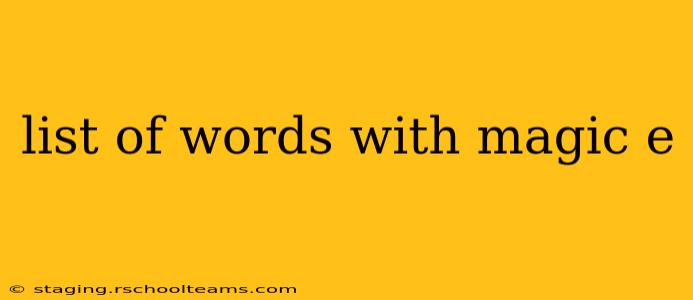The "magic e," also known as the silent "e," is a fascinating feature of the English language. This silent letter at the end of a word often changes the pronunciation of the vowel preceding it, transforming short vowel sounds into longer ones. Let's explore this magical phenomenon with a comprehensive list, categorized for easy understanding.
This list isn't exhaustive, as many words incorporate the magic "e," but it provides a solid foundation to understand this crucial element of English spelling and pronunciation.
Words with a Silent "e" and Short Vowel Sounds:
This section focuses on words where the addition of the silent "e" transforms a short vowel sound into a long one. Notice the difference in pronunciation between the word root and its longer, "magic e" counterpart.
- a: made, take, cake, game, hate
- e: these, theme, scene, be, me (Note: In some cases, the "e" is part of the digraph "ee.")
- i: ride, kite, five, like, time
- o: hope, note, bone, robe, home
- u: cube, tube, mule, use, tune
Words with "Magic e" and Diphthongs or Other Sound Changes:
The silent "e" can create diphthongs (a combination of two vowel sounds) or produce other pronunciation changes that aren't simply about lengthening a short vowel sound. Here are some examples:
- -ate: create, relate, celebrate, separate, generate (often pronounced with a long "a" sound)
- -ine: fine, shine, mine, wine, spine (the "i" sound is a long "i" sound)
- -ice: mice, nice, spice, price, rice (the "i" sound is a long "i" sound)
Commonly Confused Words:
Many words are easily confused due to the presence or absence of the magic "e." Understanding the nuances of this silent letter can help improve spelling accuracy.
- Write/Rite: "Write" (to compose) uses the silent "e" to lengthen the "i" sound. "Rite" (a ceremony or ritual) is a completely different word.
- Shine/Shin: The silent "e" in "shine" makes the "i" sound longer. "Shin" refers to the front of the lower leg.
- Hope/Hop: The silent "e" in "hope" creates a long "o" sound, while "hop" has a short "o" sound.
Frequently Asked Questions (FAQ)
What is the purpose of the silent "e" in words?
The silent "e" at the end of a word primarily serves to lengthen the preceding vowel sound. It signals that the vowel should be pronounced as its long sound instead of its short sound.
Are there any exceptions to the "magic e" rule?
While the "magic e" rule is a helpful guideline, there are exceptions. Some words may have silent "e"s that don't necessarily lengthen the vowel sound, or other irregularities exist within the English language's evolution.
How can I learn to spell words with the silent "e" more effectively?
Practice is key. Read widely, pay attention to the spelling of words with the silent "e," and try using mnemonic devices (memory aids) to remember challenging spellings. Consistent practice will improve your accuracy.
What are some strategies for teaching children about the silent "e"?
Start with simple words and highlight the difference in sounds between words with and without the silent "e." Use visual aids, games, and hands-on activities to make learning engaging. Focus on the relationship between spelling and pronunciation.
This comprehensive guide offers a detailed look at words containing the magic "e," aiming to help readers understand its impact on pronunciation and spelling. Remember, consistent practice and attention to detail are vital for mastering this important aspect of English orthography.
